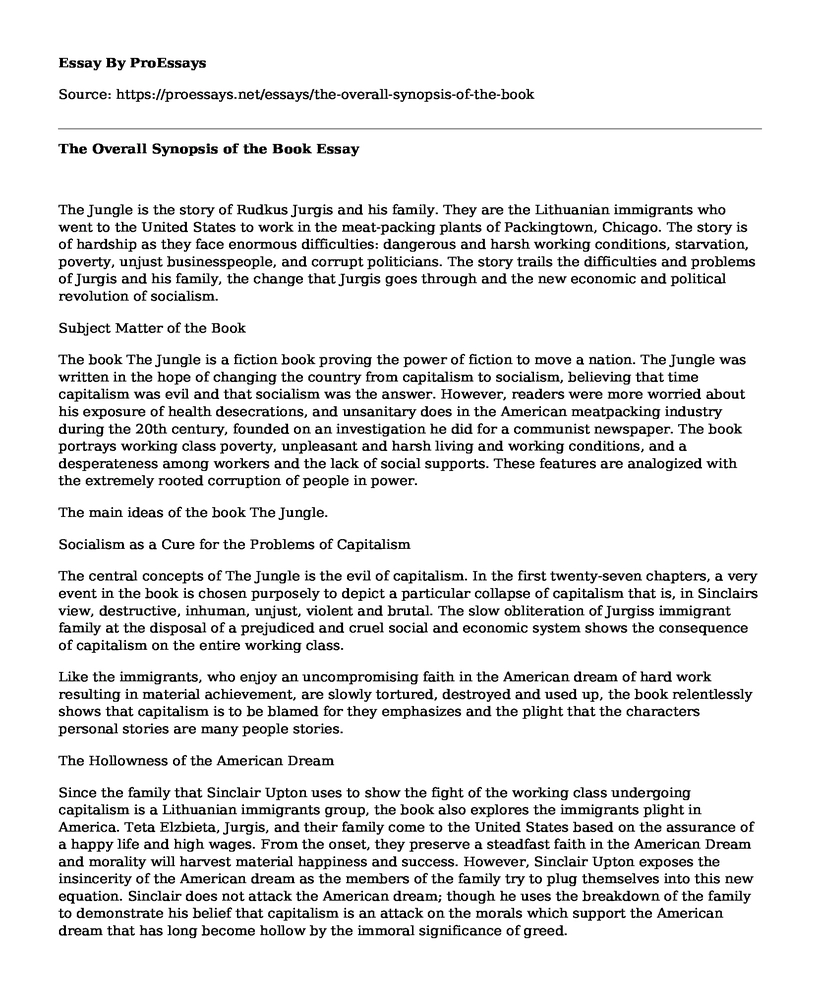The Jungle is the story of Rudkus Jurgis and his family. They are the Lithuanian immigrants who went to the United States to work in the meat-packing plants of Packingtown, Chicago. The story is of hardship as they face enormous difficulties: dangerous and harsh working conditions, starvation, poverty, unjust businesspeople, and corrupt politicians. The story trails the difficulties and problems of Jurgis and his family, the change that Jurgis goes through and the new economic and political revolution of socialism.
Subject Matter of the Book
The book The Jungle is a fiction book proving the power of fiction to move a nation. The Jungle was written in the hope of changing the country from capitalism to socialism, believing that time capitalism was evil and that socialism was the answer. However, readers were more worried about his exposure of health desecrations, and unsanitary does in the American meatpacking industry during the 20th century, founded on an investigation he did for a communist newspaper. The book portrays working class poverty, unpleasant and harsh living and working conditions, and a desperateness among workers and the lack of social supports. These features are analogized with the extremely rooted corruption of people in power.
The main ideas of the book The Jungle.
Socialism as a Cure for the Problems of Capitalism
The central concepts of The Jungle is the evil of capitalism. In the first twenty-seven chapters, a very event in the book is chosen purposely to depict a particular collapse of capitalism that is, in Sinclairs view, destructive, inhuman, unjust, violent and brutal. The slow obliteration of Jurgiss immigrant family at the disposal of a prejudiced and cruel social and economic system shows the consequence of capitalism on the entire working class.
Like the immigrants, who enjoy an uncompromising faith in the American dream of hard work resulting in material achievement, are slowly tortured, destroyed and used up, the book relentlessly shows that capitalism is to be blamed for they emphasizes and the plight that the characters personal stories are many people stories.
The Hollowness of the American Dream
Since the family that Sinclair Upton uses to show the fight of the working class undergoing capitalism is a Lithuanian immigrants group, the book also explores the immigrants plight in America. Teta Elzbieta, Jurgis, and their family come to the United States based on the assurance of a happy life and high wages. From the onset, they preserve a steadfast faith in the American Dream and morality will harvest material happiness and success. However, Sinclair Upton exposes the insincerity of the American dream as the members of the family try to plug themselves into this new equation. Sinclair does not attack the American dream; though he uses the breakdown of the family to demonstrate his belief that capitalism is an attack on the morals which support the American dream that has long become hollow by the immoral significance of greed.
Corruption
Since Jurgis and his family experience harder times in Packingtown, they found themselves surrounded by signs of corruption and immorality; laws that are not imposed, politicians out for their gain, salespersons lying about their wares, people trying greatly to get ahead through taking advantage of one another.
Recommendations
As a college student needed to read this novel, I can scrupulously say the book changed my life. It is abiding and still very significant today. I cannot forget the scenes in my mind labeled by Sinclair Upton. Sinclair Upton, a noted socialist, really showed the massive socio-economic division between the haves and have-nots or the rich and the poor. The corrupt position of United States politicians with the capitalist industrial machine should not be encouraged in our todays society. I recommend this novel to all my acquaintances. The book should become required reading, to enlighten individuals who do not remember what life used to be in the good old days.
Work Cited
Sinclair, Upton. The Jungle. New York: Grosset & Dunalp, 1906.
Cite this page
The Overall Synopsis of the Book. (2021, Mar 22). Retrieved from https://proessays.net/essays/the-overall-synopsis-of-the-book
If you are the original author of this essay and no longer wish to have it published on the ProEssays website, please click below to request its removal:
- Thank You Ma'am
- "The Yellow Wallpaper" as an Example of a Gothic Allergory Essay
- The Concept of Generational Clash in King Lear Paper Example
- In What Ways Is Identity Expressed Through Football Paper Example
- Essay Example on The Road Not Taken: Making Decisions & Being Different
- Brave New World: Individualism vs. Collectivism - Essay Sample
- Essay Example on Moral Philosophy: An Evolving Study of Right and Wrong







